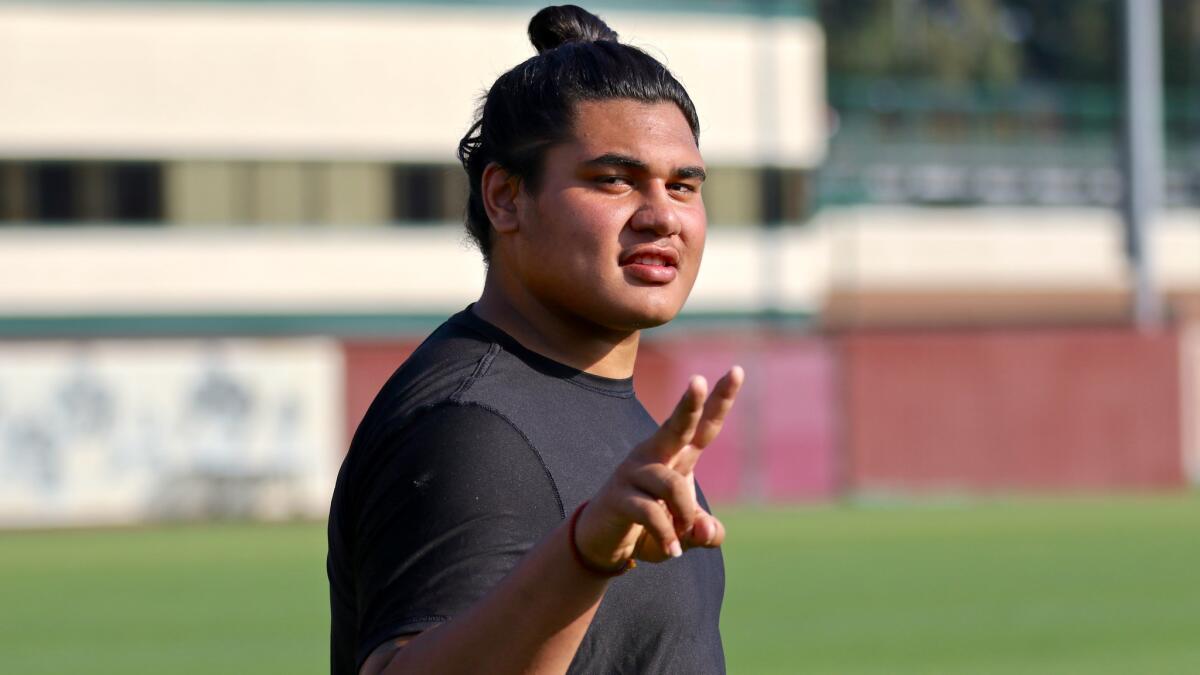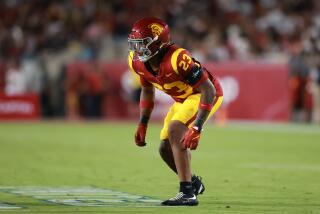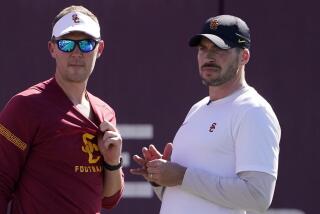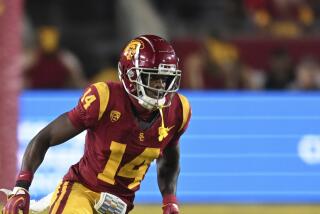How USC found its first line of defense, Brandon Pili, in the final frontier, Alaska

Kenechi Udeze wrapped frigid fingers around his phone and snapped a video. The rest of USC’s coaching staff needed to understand where he was.
Udeze was cold, very, very cold. He could see only white. He was in the dark.
He was in Alaska in the winter.
It was not a typical recruiting destination. The state remains maybe the last corner of the country largely unmined by major college football programs. But Udeze, USC’s defensive line coach, had seen a 6-foot-4, 300-plus-pound defensive tackle from Anchorage play. He had seen him move. So he packed warm clothes and headed north to meet with Brandon Pili.
It is difficult to imagine that Pili, now a freshman at USC, ever had difficulty getting noticed. He is already listed as USC’s second-heaviest player (though by now coaches believe he is the heaviest), and he is surprisingly nimble. He can dunk a basketball on one leg. (“It’s amazing,” coach Clay Helton said. “He can get up.”) He does cartwheels. Messing around during practice recently, he ran routes, scrambled and threw passes on the run.
“He’s a big polar bear,” Helton said. “I mean, he’s a 340-pound dancing polar bear.”
Yet Pili believes he wouldn’t even be on a Division I roster had he not, a year ago, made one crucial decision.
Pili was born of extremes. His father, Billy, lived in Hawaii until his family moved to Alaska in 1990. Pili’s mother, Heather, grew up in Barrow, Alaska, at the very tip of the state, where the United States ends. Barrow sits about 350 miles north of the Arctic Circle. It is where Pili lived the first years of his life.
There is no grass in Barrow, only tundra. There was no turf field when Pili lived there, so he played basketball only.
Billy believes that playing multiple sports — Pili also wrestled — nurtured his son’s unusual athleticism. By high school, Pili had grown to 300 pounds, and he dominated his league.
Still, he had no scholarship offers, so Billy began encouraging his son to transfer to a high school down south, maybe in Oregon, where he had relatives.
“I wanted him to get out,” Billy said. “Then, I did not know that he would be D-I caliber. But he had all the potential to be.”
The elder Pili had once played football too, but he had grown fed up with school. He never tried for college.
In Alaska, college coaches don’t often come beckoning with an alternative. Only 1.2% of Alaskan football players receive football scholarships, lower than all states except Maine (1.1%) and Vermont (.9%), according to the NCAA. From 2010 to 2016, Alaska was the only state in the country without a recruit rated three stars or higher in 247Sports’ composite of the major recruiting rankings.
Initially, Pili resisted his father’s overtures. He didn’t want to leave his friends and family. In the summer before Pili’s senior year, during camping trips and days spent fishing salmon, Billy worked on him again. Brandon, again, resisted.
Senior season began. Pili played his first game.
After Pili walked off the field, he told his father he would move — just like that.
“I was like, ‘It’s about time,’” Billy said.
Brandon, the eldest of seven kids, explained that he felt he owed it to his parents to try for a scholarship.
“I just didn’t want to see my parents pay for college, so I knew I had to get out of there,” Pili said. “I wouldn’t get any scholarships playing in Alaska because nobody thinks there’s competition in Alaska.”
The Pilis knew of other Alaskans who had earned Division I scholarships, but not of anyone who went straight from an Alaskan high school. Three other Alaskans signed with Football Bowl Subdivision schools this year. Both went to junior college. The only player to sign out of high school in Alaska went to Arkansas Pine Bluff, in the Football Championship Subdivision.
So Pili moved to Oregon, already a game into his senior season. He got clearance to play.
“And he created a whirlwind of recruitment,” Udeze said.
Suddenly, against suitable competition and in front of scouts, Pili was swimming in offers. USC linebackers coach Johnny Nansen broke down Pili’s tape, including games from Alaska, where the film could be spotty.
“It was just something you see on tape, when guys pop, they pop,” Udeze said.
USC hosted Pili for an official visit. He returned to Alaska after the football season, and Udeze was one of three coaches to trek to Alaska, including Nansen, who followed soon after.
“Man, as soon as I spent time with Brandon and visiting his school, talking to his coach, I’m not going to lie, I had to get out of there as soon as possible,” Udeze said. “It was cold.”
It was worth it. Pili signed shortly after.
During training camp, Pili said learning the nuances of technique has taken time, “because in Alaska all do is just go bullrush and go get the ball.” But he has not looked like a long-term project. He has already worked his way toward the rotation at defensive tackle, along with freshman Marlon Tuipulotu and senior Josh Fatu.
“He’s going to be a star here, there’s no question in my mind,” Helton said.
Pili said he misses the endless summer days in Alaska, when the streetlights never blink on. He misses the salmon running in the summer and nights spent camping by a lake. He said he misses the people, mostly.
But a little more than a year ago, he said, he didn’t even know he was good enough to play at any Division I school. He is glad he gave himself the chance to find out.
Follow Zach Helfand on Twitter @zhelfand
More to Read
Go beyond the scoreboard
Get the latest on L.A.'s teams in the daily Sports Report newsletter.
You may occasionally receive promotional content from the Los Angeles Times.







